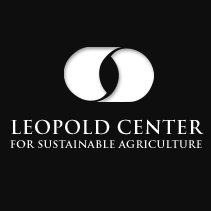Leopold Center for Sustainable Agriculture
The Center's mission includes an educational component to inform the agricultural community and the general public about its 30 years of research findings.
- Type:
- Agroecology
- Establishment year:
- 1987
- Categories:
- Research, Policy, and Extension/Outreach Programs
- Keywords:
- General info
-
The Center's work focuses on four initiatives: ecology, marketing and food systems, policy, and cross-cutting. Funding comes from state appropriations and from fees on nitrogen fertilizer and pesticides, as established by the 1987 Iowa Groundwater Protection Act.
The Center is named for Aldo Leopold (1887-1948), a native of Burlington, Iowa, known internationally as a conservationist, ecologist, and educator. He saw the need for development of a land ethic, outlined in his 1949 book of essays, A Sand County Almanac.
Mark Rasmussen is the Leopold Center director. A 17-member Advisory Board advises the director on research proposal funding, policies, budget and program review.
As part of its long-standing Competitive Grants Program, the Leopold Center makes funds available to researchers, investigators, and educators at all Iowa colleges and universities, and at Iowa nonprofit agencies and foundations. These awards often act as seed money for other larger sources of funding for research projects. Since 1988, the Leopold Center has awarded more than 500 competitive grants.
The Center's mission includes an educational component to inform the agricultural community and the general public about its research findings. The Center collaborates with ISU Extension and Outreach and others to communicate research findings. It also supports conferences, seminars and special events related to the four research initiatives.
The Leopold Center has a national reputation for supporting cutting-edge research which is leading to significant dividends for Iowa -- cleaner water, better conservation of natural resources, and greater agricultural vitality.


Leopold Center for Sustainable Agriculture
The Center's mission includes an educational component to inform the agricultural community and the general public about its 30 years of research findings.